CREATING COMMUNITIES OF CHANGE WITH NUTRITION EDUCATION IN BANGLADESH
Community Nutrition Scholars
Community education driving change
The afternoon light is soft and dappled as it strains to make its way through the foliage of the trees. A group of women arrive and enter through the small gateway in the bamboo fence and make their way to the center of the dirt courtyard surrounded on either side by two small bamboo houses. They are joining a group of 8 women who are already seated along a stretch of orange tarp laid out along the ground. The women greet each other with smiles and quietly find a place to sit.
The women look expectantly towards one end of the courtyard where posters have been strung up and a collection of crops and kitchen supplies are sitting on the ground ready for use.
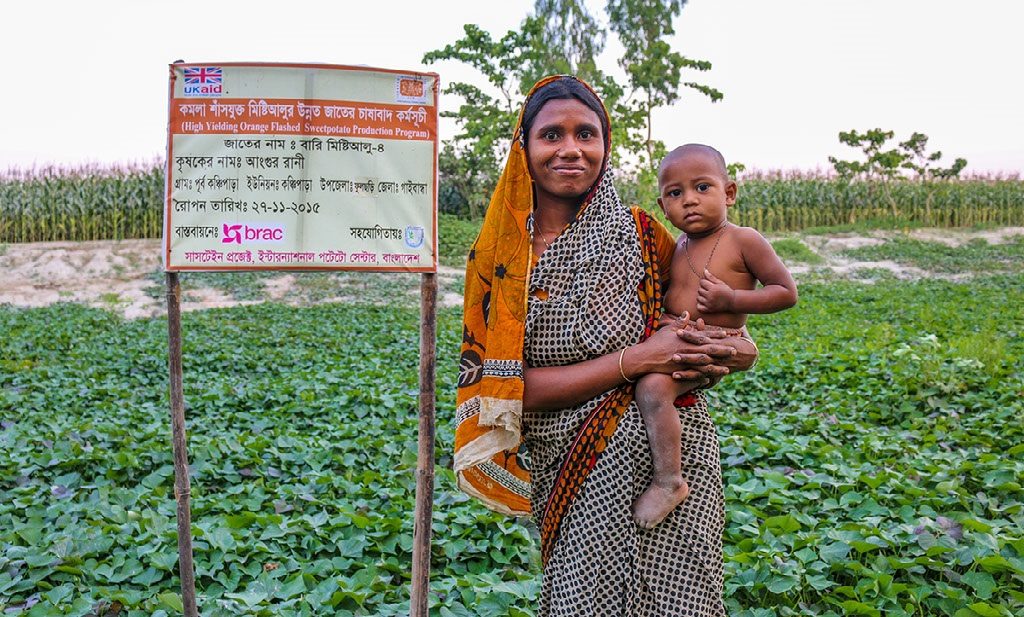
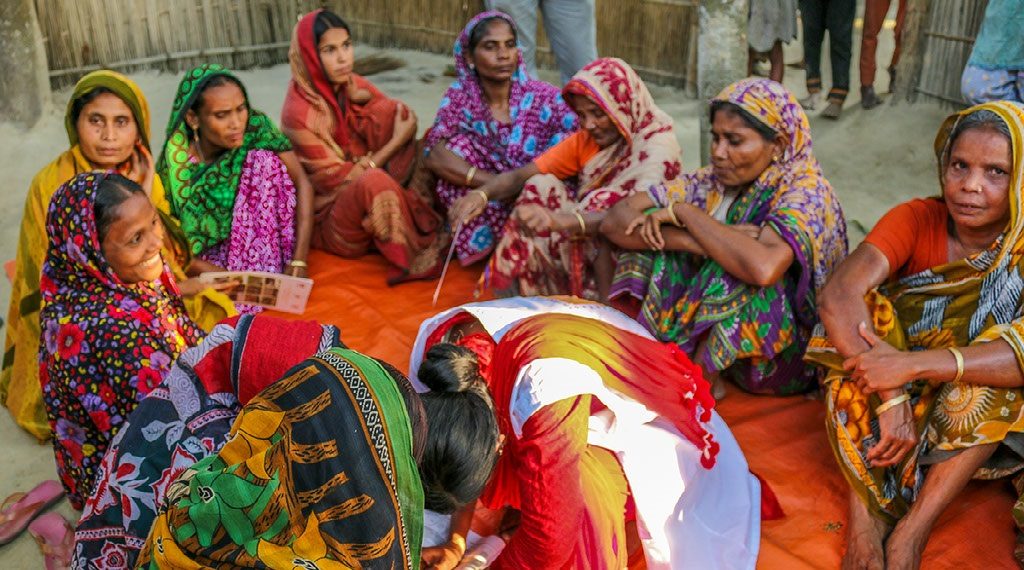
A quiet chatter between the women starts up as they greet each other and discuss news of the day. Children from the neighboring houses gather to peer over the back fence and through the small holes in the bamboo. Some of them gather at the gate, jostling with each other for the best position to see what is going on.
It is a quiet afternoon here in rural Gaibandha and life is unfolding as it does most days. Many villagers are out in the field working their farm and children are making their way back from school along the winding dirt tracks which take them past vibrant green fields of rice and past local farmers transporting their crops to market.
Household change to improve health and nutrition
These women have gathered today to participate in a community education program to learn about nutrition, sanitation, health and hygiene. The sessions are led by a community nutrition scholar (CNS), primarily young women from the community who have been trained to deliver a series of education modules on these issues. The scholars are from the community with which they work and have a strong rapport with the women who attend.
These sessions are being implemented as part of the DFID funded Scaling up Sweetpotato through Agriculture and Nutrition (SUSTAIN) project which is currently being implemented by the International Potato Center in partnership with local NGOs – Proshika and BRAC.
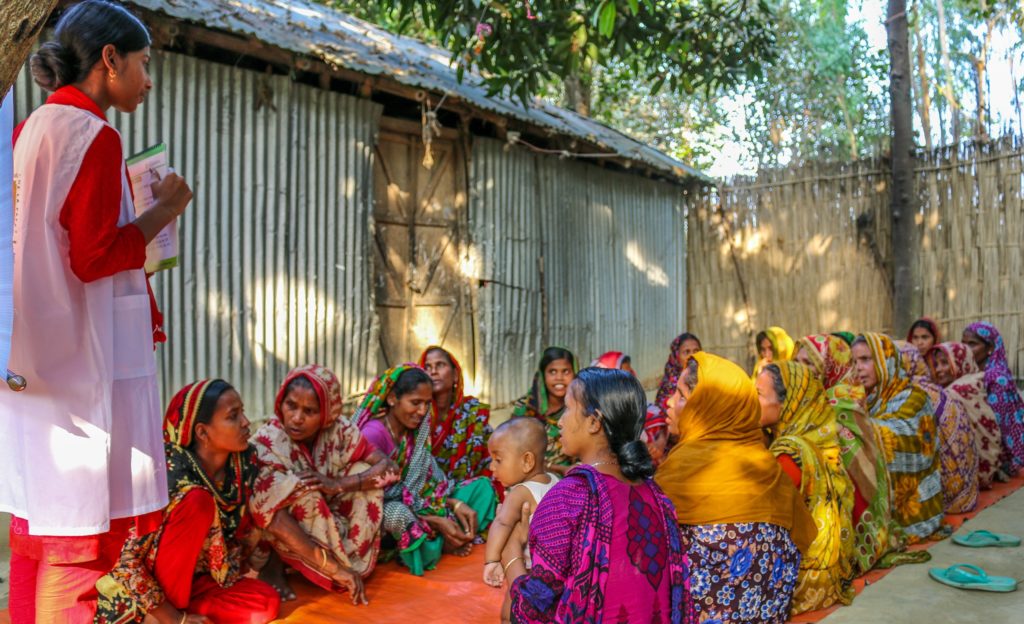
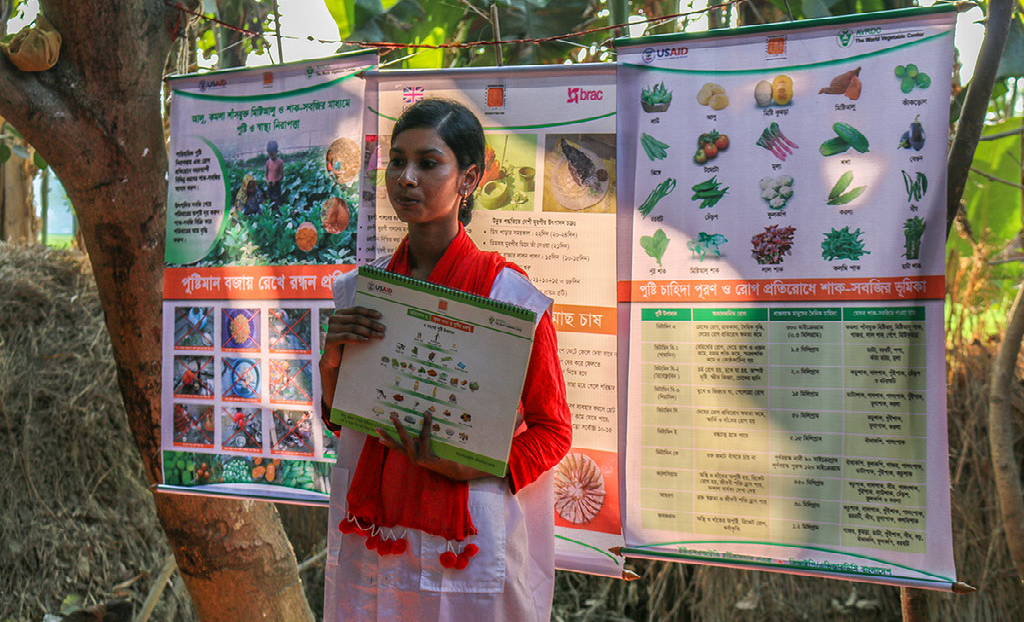
Improving outcomes for the next generation
ln Bangladesh, 40 percent of the country’s 162 million people struggle with poverty and poor nutrition. An over-reliance on cereal-based diets contributes to significant micronutrient deficiencies and rates of under nutrition are among the highest in the world. While rice is an affordable staple food for the country’s poor, it lacks the vitamins and minerals that are essential for a healthy and balanced diet. It is with this in issue in mind that the International Potato Center (CIP) along with national partners is working to scale up the production and consumption of micronutrient-rich vegetables such as orange fleshed sweetpotato. Through a variety of approaches, CIP and its partners are working to improve nutrition and livelihoods and to provide communities with an improved ability to source and provide nutritious food at the household level.
To increase, improve and diversify diets to enhance health and incomes, the CIP, in partnership with groups such as BRAC and the Bangladesh Agricultural Research Institute (BARI), is trialing adapted varieties of orange fleshed sweetpotato that are better suited to local conditions; working to develop a supply of clean planting material for OFSP, and introducing system-level innovations, such as integrated crop management techniques. CIP is also building partnerships for collective action and achieving income and nutrition benefits at scale through food systems and institutional innovations.
While Bangladesh has implemented a successful vitamin A supplementation program over the last two decades and has been fortifying vegetable oil with vitamin A since 2012, the prevalence of VAD remains a serious public health problem. (FAO)
Improving nutrition can have a significant impact on survival as well as physical and cognitive development and productivity. Good nutrition, comprising adequate quality and quantity of food and reduction of illness is a basic human right and is an essential input for economic development. (FAO)
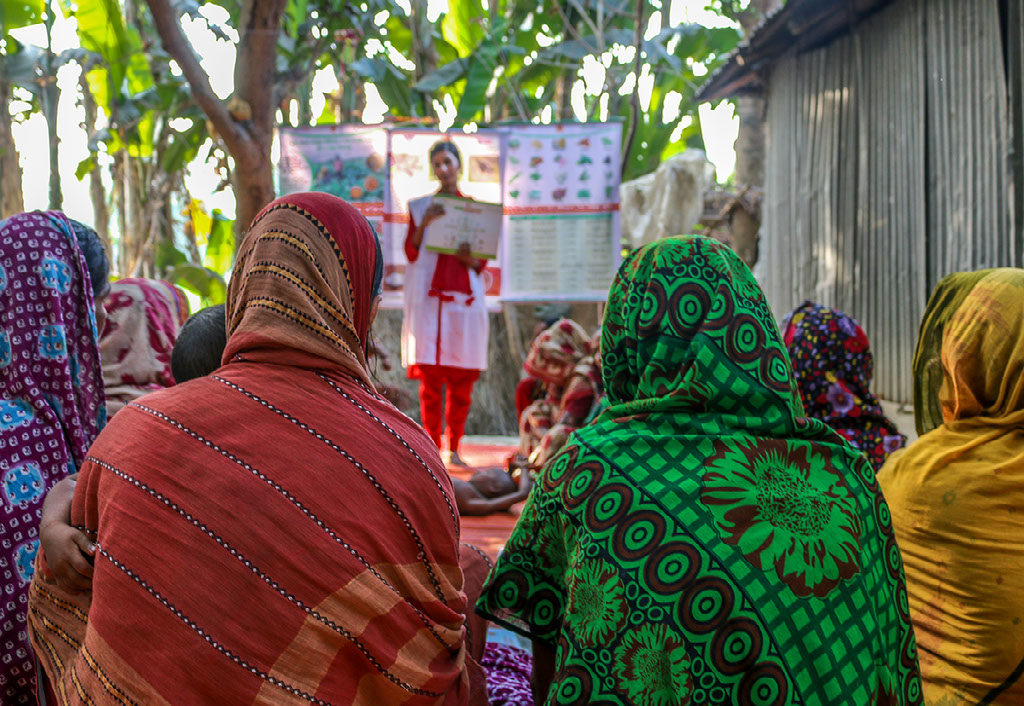
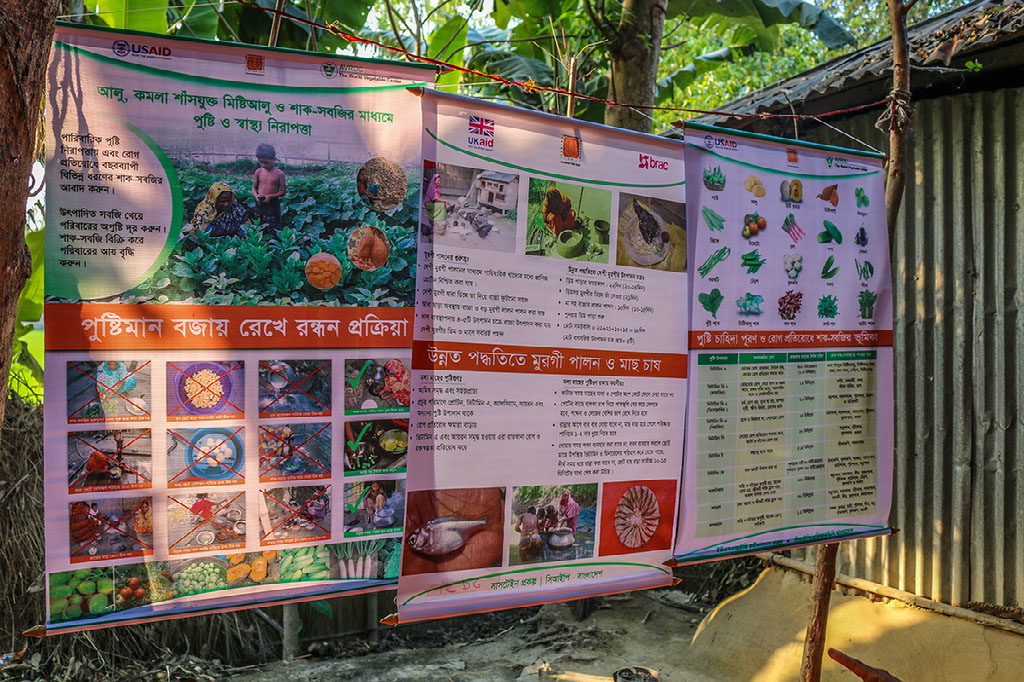
Women teaching women
The community nutrition scholar is in charge of teaching six groups each with 20 women a course of 12 sessions over 3 months. In addition, the CNS also visits each woman at her home 3-4 times over this period to support her to implement at the household level what is being taught. The orange fleshed sweetpotato is highlighted during these sessions as a nutritious and resilient crop – but it is diet diversity and the importance of nutritious, hygienic food that is the core message.
The women learn that OFSP among other food items is high in Vitamin A and a great food choice for children under 5 years of age and pregnant or lactating women. The women are also provided with OFSP vines, mini seed packs of vegetables and are taught how to plant, care for and harvest the plants and participants receive basic training on vine propagation and cultivation so that they can establish small household gardens in which to grow OFSP.
The CNS uses informative flash cards and posters to share this knowledge and each woman is provided with a booklet outlining the key issues that are discussed over the 12 weeks in the local language. The booklet covers topics on basic nutrition, linkage between agriculture and nutrition, under-nutrition and diseases, appropriate cooking practice, role of OFSP in eliminating Vitamin A deficiency, essential health care, personal hygiene and techniques of communication and facilitation.
This work, initially funded through a USAID funded Horticulture Project and now through the DFID funded SUSTAIN project, woman are being trained as CNS to disseminate nutrition messages in communities including Jessore, Barisal, Faridpur, Gaibandha, Satkhira and Patuakhali districts.
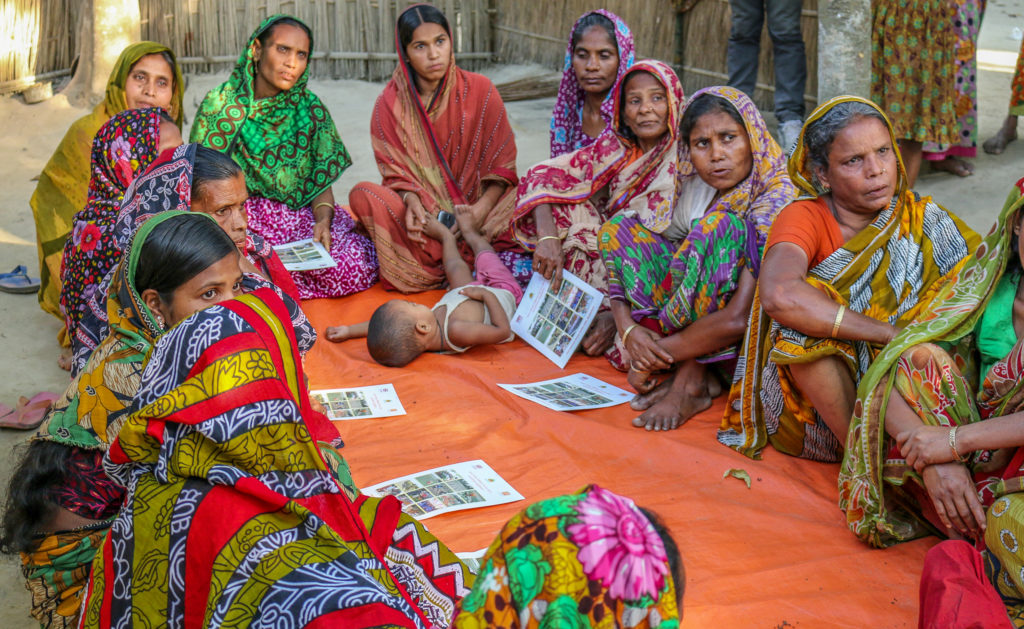
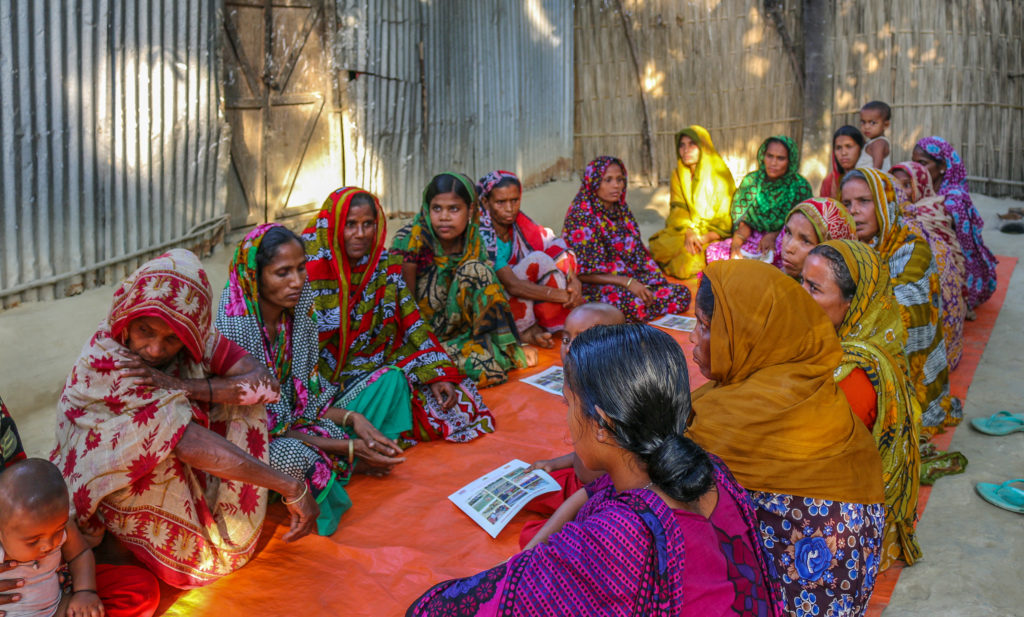
Community based, Community led
As the session comes to a close, the children rush forward to greet the women who are their mothers, aunties, grandmothers and neighbors. The sense of community here is palpable as the women and children together thank the teacher and make there way back down the winding path to their homes. You get the sense that these women are working together, as a community, to make change as a united force and to implement these small, but significant, changes that they have learnt. And while these changes may be small they can lead to improved livelihoods for them, their children and future generations of boys and girls growing up in rural Bangladesh.
On the walk home, the women occasionally stop to check in on their, or their neighbours fields of orange fleshed sweetpotato. The vines are growing well in the sandy soil of Gaibandha in northern Bangladesh. Sandwiched between the never ending fields of rice and wheat they stand out and the women are proud to be growing this crop. The vibrant green of the OFSP vines stand out amongst the clay colored soil and their bright colour and vibrant growth are a sure sign of how nutrition can improve life and create a momentum for change for families who call this area home.
In Bangladesh, the International Potato Center is currently implementing the SUSTAIN project which is a 5-year partnership (2013-2018), coordinated by CIP and financed by the UK Department for International Development, to scale up the nutrition benefits of bio-fortified orange-fleshed sweetpotato (OFSP) in Bangladesh, Kenya, Malawi, Mozambique, and Rwanda and the spillover countries of Zambia and Tanzania. The goal is to reach 1.2 million households with under-5 year old children. SUSTAIN supports integrated interventions in agriculture, nutrition, utilization, and marketing to strengthen production and consumption of OFSP. SUSTAIN emphasizes rigorous measurement and evaluation in order to assess the scalability of these interventions and contribute to global evidence on achieving large scale nutrition outcomes through bio-fortified crops.
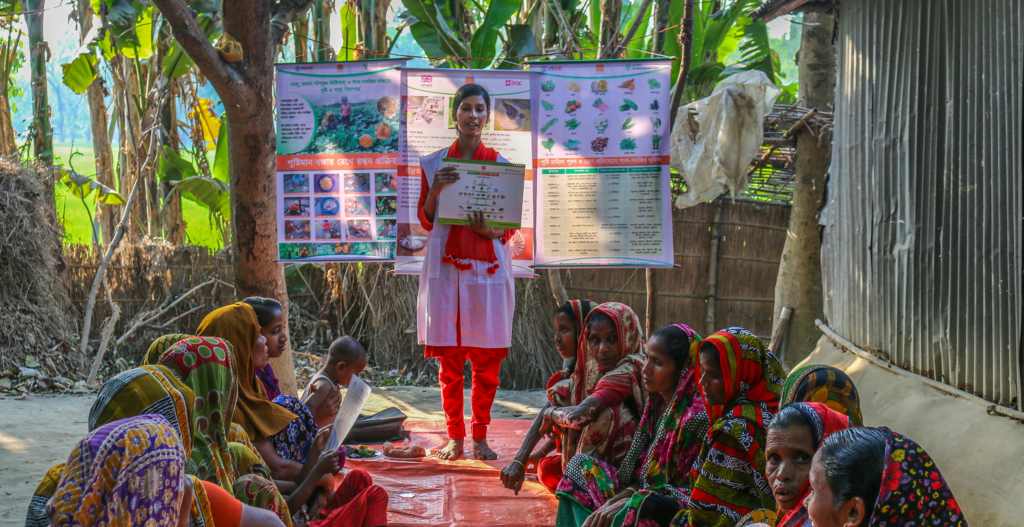
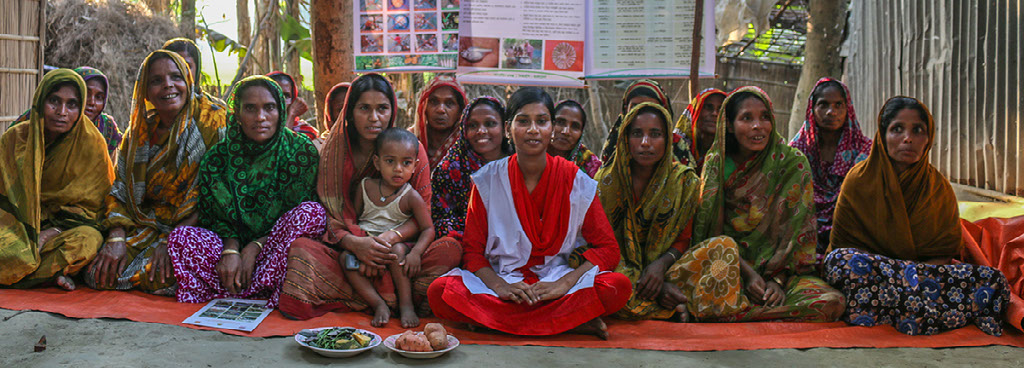
CIPs Bangladesh projects are building on continued progress in sub-Saharan Africa where the International Potato Center (CIP) has been working to bring the nutritional benefits of OFSP to nearly 2 million households in countries across sub-Saharan Africa affected by vitamin A deficiency. Over many years of working on OFSP, CIP has demonstrated that rigorous research in agriculture and health sciences can be combined to create solutions for global nutrition challenges and that these can be scaled up to reach millions of vulnerable families.
